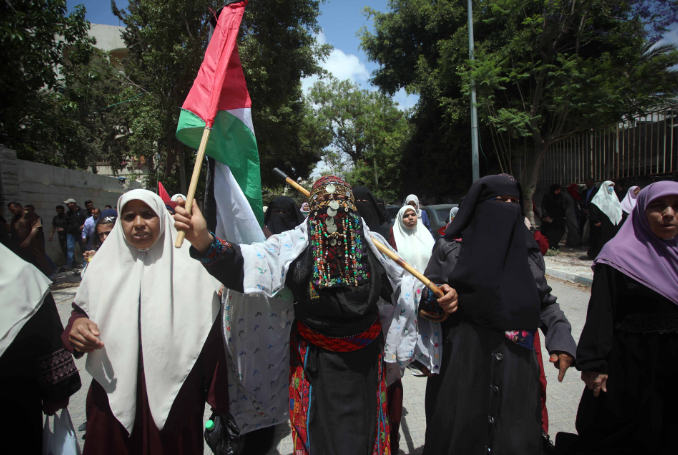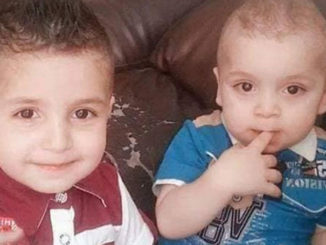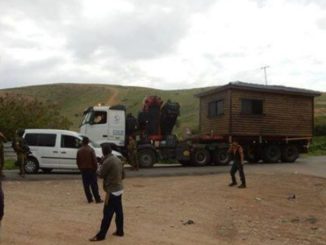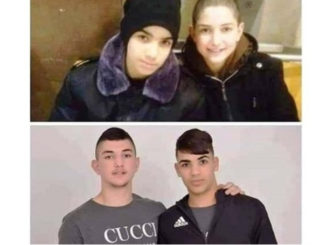
By Benay Blend
On Nakba Day 2022, thousands of people around the world marked the 74th anniversary of the “catastrophe” of 1948 that saw nearly 800,000 Palestinians expelled from their homes as Zionists established the illegal state of Israel. Demonstrators also demanded justice for the slain Al Jazeera journalist Shireen Abu Akleh who was assassinated by Israeli forces in Jenin within the Occupied Palestinian Territory.
Appropriately, on May 15, poet and activist Remi Kanazi tweeted: “Why solidarity matters. It’s Nakba Day. Other communities are in pain and dealing with supremacist forces. If we don’t fight against all systems of domination and build with each other,” he warned, “the oppression we face will never truly end, even if we think it does.”
As if in answer, an Azov-insignia wearing teen carried out a mass shooting at a supermarket in Buffalo, New York. Because 11 out of the 13 victims were black, the Federal Bureau of Investigation (FBI) and the police have labeled the murders a “hate crime.”
The problem with this label is that it implies that the crime was an act of a lone individual acting on racist impulses. The solution, many believe, is gun control. Both assumptions are mere band-aids on the problem. Whether a member of an organized group or not, this man was not a lone shooter, but rather part of a larger Nazi movement.
As Benjamin Norton noted, the shooter was wearing the same “black sun” Nazi symbol used by Ukraine’s neo-Nazi Azov militia, which NATO is arming and training. According to an Al Jazeera report, Ukraine has emerged as an international center for the far right around the world. There Azov has been active in training men who want combat experience and share a fascist ideology.
The soldier who murdered Abu Akleh also acted as a member of a particular society, writes scholar/activist Steven Salaita, doing “exactly what Israeli soldiers do.” Indeed, over the past two decades the Zionist state has murdered approximately fifty journalists, making Abu Akleh’s death not an aberration, a mistake, but rather a matter of policy.
The colonizer, concludes Salaita, perpetuates violence “because of colonization.” In the end, it is “the only way he knows how to be a good citizen” while maintaining a “meaningful existence” for himself.
Just as few shooters act alone, but rather as products of their worldview, so do those who successfully work for social justice do so in community. Mourning the assassination of her compatriot, Gaza-based Palestinian journalist Wafa Aludaini writes that Abu Akleh was a household name in local homes because she documented Israeli crimes.
In her own words, Abu Akleh attests to her close connection to community: “I chose journalism,” she explained, because she wanted to be “close to the people. It might not be easy to change reality,” she continued, “but at least I could bring their voice to the world.”
Writing is a solitary endeavor, but the formation of ideas is not. In the introduction of These Chains Will Be Broken: Palestinian Stories of Struggle and Defiance in Israeli Prisons (2020), Ramzy Baroud, activist/journalist/writer and editor of this collection, declares that “because Palestinian resistance is a collective experience, the writing of this book has also been a collective effort. It is our attempt to reclaim the narrative of our people,” he continues, “to liberate it from the suffocating confines of political, media and academic discourse and take it into the heart of resistance.”
Palestine solidarity by its very definition is also a communal effort, the work of many groups of individuals whose histories are likely different but whose goals for the future intersect with those of all colonized peoples around the world.
My own involvement began around 1980 with a Muslim/Jewish dialogue group organized by fellow grad students at the University of New Mexico. Since then, my activism has evolved away from conversations that by their very nature involve a power gap to direct involvement/writing that attempts to place Palestinians at the center. At the present time my activist work involves membership in the recently organized Albuquerque chapter of Samidoun: Palestinian Prisoner Solidarity Network. As a writer, I’ve also learned that very little happens in a vacuum; formulation of ideas requires a give and take between people of similar, and sometimes different, persuasion. From all those years I’ve learned the importance of being part of an organization.
Solidarity means maintaining unanimity no matter where the media directs our attention. “Empathy’s endurance,” writes Onyesonwu Chatoyer, organizer for the All African People’s Revolutionary Party—Southwest, makes possible “a better and more just way of living” that is “within our capacity” to rebuild. At the present time, however, our inner lives are being “weaponized and manipulated,” especially among the “disorganized and unconscious” elements of our society.
In his preface to Our Vision for Liberation: Engaged Palestinian Leaders and Intellectuals Speak Out (2022), Ramzy Baroud defines the parameters of the struggle. “Solidarity that is not guided by authentic Palestinian voices is simply futile,” Baroud declares, “it cannot effectively mobilize what is essential: their purpose” (p. xviii).
The collection’s chapters are a testament to the ability of Palestinians—and by extension all people who are engaged in freedom struggles—to liberate themselves. Reflecting on “The International Struggle on Behalf of Palestine,” co-editor Ilan Pappé shares three major truths that he has learned during his decades-long involvement in the solidarity campaign. First, solidarity for an Israeli Jew means moving away from Zionism and its “comfort zone”; second, winning the trust of the Palestinian people remains crucial; and finally, trying to influence others to follow the same path is hard (p. 411).
In an interview with Asantewaa Nkrumah-Turé, organizer with Black Alliance for Peace Philadelphia, Margaret Kimberly led the conversation in a way that resonates well with Baroud’s and Pappe’s interpretation of solidarity. Nkrumah-Turé began by speaking of her experience on a panel at the recent Al-Awda Conference in New York. There she tied her anti-imperialist work to Palestine solidarity, commitments that she traced back to the long history of Black support for the Palestinian struggle,
For example, Nkrumah-Turé mentioned her late brother Kwame Turé who came out against Zionism during his involvement with the Student Nonviolent Coordinating Committee (SNCC). In this way her trajectory is different than Pappé in that she did not have to leave Zionism in order to oppose it.
Like Baroud and Pappé, Nkrumah-Turé acknowledges other groups who have come to share her position. For example, she salutes Jewish Voice for Peace (JVP) for what she believes must have been a “difficult move” when they came out with a public statement denouncing Zionism.
Finally, she addresses what Pappé calls the “tension between effort and tangible results” (pp. 411,412), losing hope due to the lack of significant changes on the ground. In answer, both highlight the importance of looking to the future. For Pappé, the solution is asking if we “have done enough for the cause,” and for Nkrumah-Turé, a similar response: developing the kind of courage to stay in the fight for the long haul.
For me, it is helpful to consider all of the activists mentioned in this article, along with the contributors to Our Vision for Liberation, as the energy who provide sumud (steadfastness) and inspiration for the future struggle.

– Benay Blend earned her doctorate in American Studies from the University of New Mexico. Her scholarly works include Douglas Vakoch and Sam Mickey, Eds. (2017), “’Neither Homeland Nor Exile are Words’: ‘Situated Knowledge’ in the Works of Palestinian and Native American Writers”. She contributed this article to The Palestine Chronicle.







